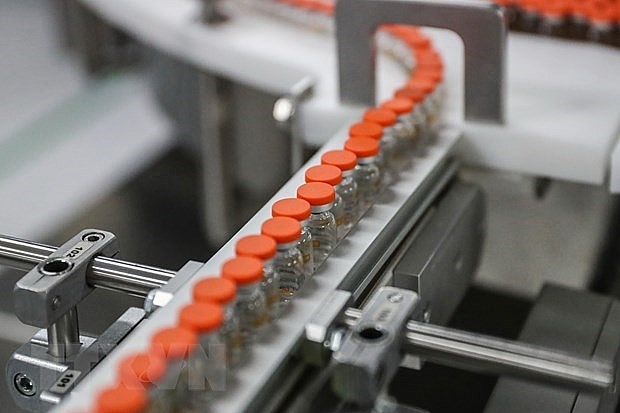Southeast Asian nations rapidly deploy COVID-19 vaccination
 |
| Illustrative image (Photo: Xinhua/VNA) |
Jakarta - The Food and Drug Supervisory Agency (BPOM) of Indonesia has considered granting emergency using licenses for three COVID-19 vaccines namely AstraZeneca, Sinopharm and Novavax, Head of BPOM Penny K. Lukito said.
Speaking at an online press conference on February 7, Peny said it will take up to 20 working days for the consideration process after BPOM has received all the necessary data from pharmaceutical companies representing vaccine manufacturers.
According to Penny, BPOM is still waiting for these companies to complete the submission of data.
However, data may be provided in stages, while the consideration is under process. Sinovac's Coronavac vaccine is the only one that has received an emergency licence from BPOM to date.
In January 14, Indonesia officially launched the first phase of its national programme on free vaccination against COVID-19 among health workers and civil servants, with three million doses of Coronavac vaccine provided by Sinovac.
The Indonesian government's updated data shows that nearly 800,000 people were given the first shot.
Another 25 million doses of the vaccine are expected to be produced by the end of March with materials supplied by Sinovac, local officials said.
Previously, the Indonesian government also identified seven COVID-19 vaccines that will be considered to be used in the country, including Sinopharm, AstraZeneca, Pfizer, Moderna, Novavax, Sinovac, and the Red and White Indonesian-developed vaccine.
Meanwhile, Fresh News of Cambodia has reported that 600,000 doses of COVID-19 vaccine funded by China were delivered to Cambodia on February 7.
Under the plan, China will provide 1 million doses of COVID19 vaccine to Cambodia. In the first phase, 300,000 doses will be handed over to the Health Ministry, and the remaining 300,000 doses to the Ministry of Defence.
A number of other Southeast Asian countries are also gradually implementing the COVID-19 vaccination programme.
Singapore started its vaccination programme at the end of December 2020 and is expected to have enough vaccines for all residents by September 2021.
Despite reaching an agreement to import 2 million doses of vaccine from China before April 2021 for health workers, Thailand has to rely on the AstraZeneca-Oxford vaccine of the UK that will be produced domestically for its extensive vaccination programme .
What the stars mean:
★ Poor ★ ★ Promising ★★★ Good ★★★★ Very good ★★★★★ Exceptional
Related Contents
Latest News
More News
- Russian President congratulates Vietnamese Party leader during phone talks (January 25, 2026 | 09:58)
- Worldwide congratulations underscore confidence in Vietnam’s 14th Party Congress (January 23, 2026 | 09:02)
- Political parties, organisations, int’l friends send congratulations to 14th National Party Congress (January 22, 2026 | 09:33)
- 14th National Party Congress: Japanese media highlight Vietnam’s growth targets (January 21, 2026 | 09:46)
- 14th National Party Congress: Driving force for Vietnam to continue renewal, innovation, breakthroughs (January 21, 2026 | 09:42)
- Vietnam remains spiritual support for progressive forces: Colombian party leader (January 21, 2026 | 08:00)
- Int'l media provides large coverage of 14th National Party Congress's first working day (January 20, 2026 | 09:09)
- Vietnamese firms win top honours at ASEAN Digital Awards (January 16, 2026 | 16:45)
- ASEAN Digital Ministers' Meeting opens in Hanoi (January 15, 2026 | 15:33)
- ASEAN economies move up the global chip value chain (December 09, 2025 | 13:32)

 Tag:
Tag:




















 Mobile Version
Mobile Version